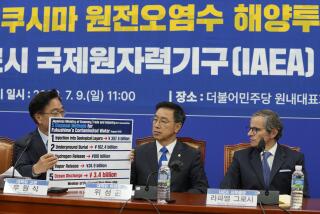Japan’s Plan to Ease Third World Debt Meets Skepticism
- Share via
WEST BERLIN — Finance leaders of industrial nations on Wednesday questioned a Japanese plan for easing the Third World debt problem, while poor countries renewed their appeals for more help.
Nigel Lawson, the British chancellor of the exchequer, told reporters at the annual meeting of the International Monetary Fund and World Bank that he found the Japanese proposal “a little bit elusive.”
Japan’s central bank governor, Satoshi Sumita, announced the plan Tuesday as a way to help the big debtor countries, such as Brazil and Mexico, which have a total debt of more than $220 billion.
Under the plan, some of the countries’ foreign debts would be converted into bonds. Interest on the bonds would be backed up by escrow accounts that the debtors would set up with the IMF, and the bonds could then be sold to banks and other financial institutions.
Sumita did not provide many details about the idea, and some finance chiefs said they needed more information.
Lawson said the plan would not be acceptable if it called for making public agencies, rather than the banks, bear the risk of non-payment by debtor countries.
“The question arises as to how the countries concerned are to acquire the collateral which they would place with the fund under the scheme,” he said. German Finance Minister Gerhard Stoltenberg told reporters that “in essence every initiative should be welcomed.”
But Stoltenberg said he wanted to know more and questioned whether the IMF should hold escrow accounts for the debtors.
“We want to study that very carefully,” he said. “We want to see if there are other ways. We have to assess whether the IMF should, or has to play that role.”
The IMF has been key in drawing up financial rescue packages for developing countries that cannot meet their debt payments. Its sister organization, the World Bank, provides the countries with aid for economic development.
Many of the finance officials from the 151 member nations of the organizations are attending the annual meeting, which ends today.
The major industrial nations gave final approval during the weekend to a plan that would aid the poorest debtors, mostly in sub-Saharan Africa. But the bigger debtors also would like special treatment.
The industrial nations have been following the Baker Plan for the debt problem. That plan, devised by former U.S. Treasury Secretary James A. Baker III, calls in part for providing new loans to developing countries that enact economic liberalization policies.
More to Read
Sign up for Essential California
The most important California stories and recommendations in your inbox every morning.
You may occasionally receive promotional content from the Los Angeles Times.













